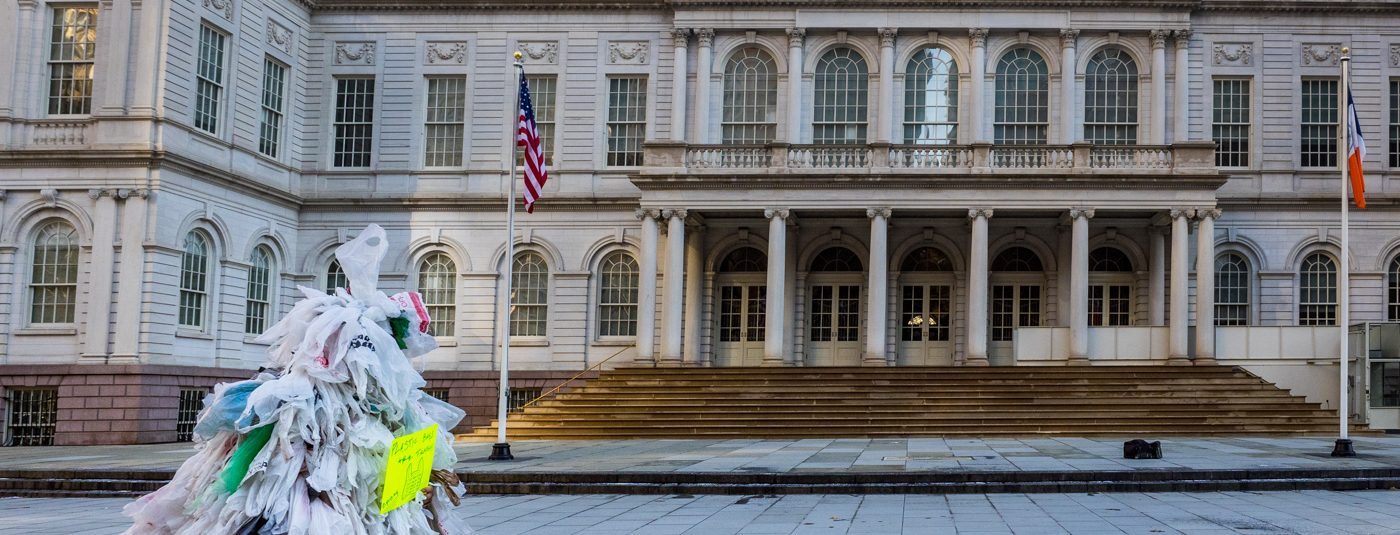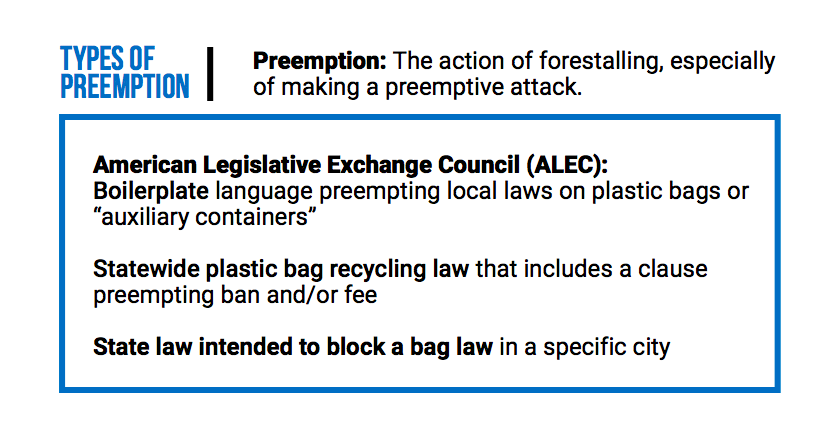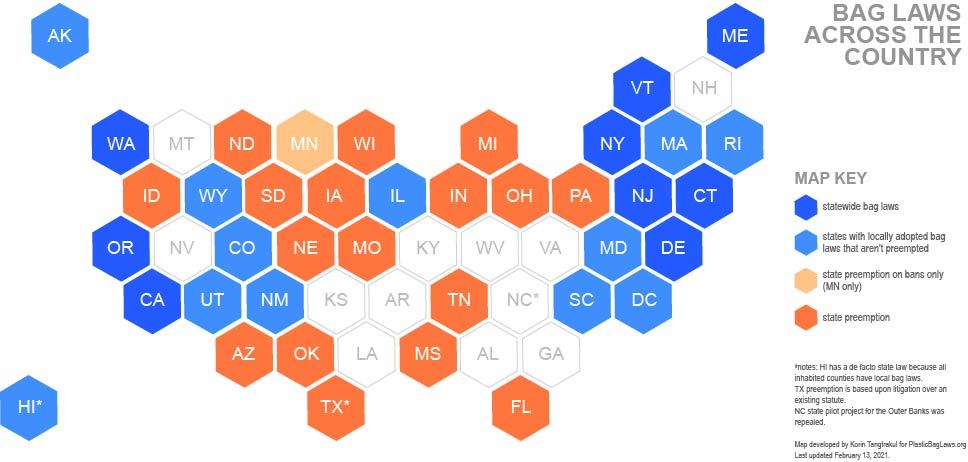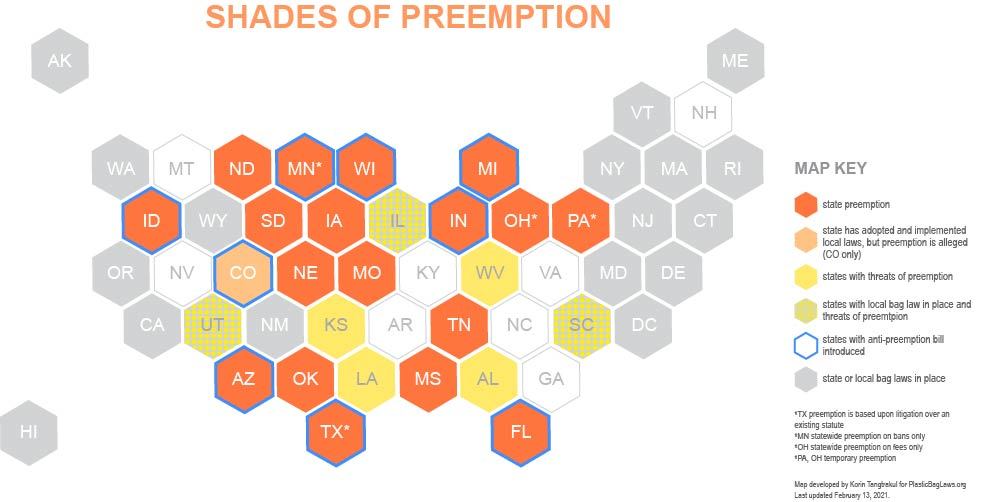
Despite the unprecedented challenges presented by the COVID-19 pandemic, the Surfrider Foundation has continued to make progress on plastic pollution reduction laws. As we enter 2021, over 500 local plastic bag ordinances have been adopted in 28 states, and 9 states adopted statewide plastic bag reduction laws. Washington State and New Jersey adopted statewide bag laws in 2020, joining California, Connecticut, Delaware, Maine, New York, Oregon, and Vermont.
Unfortunately, we also encountered new obstacles, including 3 new plastic pollution preemption laws — Ohio, Nebraska, and South Dakota — bringing the nationwide preemption total to 18.
Preemption is an insidious plastics industry tactic that blocks municipalities from adopting local plastic reduction legislation. Our Plastic Bag Law Activist Toolkit describes the preemption doctrine as the concept that a higher authority of law will displace a lower authority when two authorities come into conflict (e.g., federal law trumps state law, state law trumps local law). This can take the form of a targeted plastics preemption bill, a clause added to a statewide recycling law, or even a provision added to a larger bill that might not have anything to do with plastics (for an example, see Nebraska’s LB632). The most common type of plastic preemption law is American Legislative Exchange Council (ALEC) model legislation that blocks all local laws relating to “auxiliary containers,” meaning bags, boxes, cups, and bottles.

The momentum for laws to address plastic pollution, including banning plastic bags and/or EPS foam, often starts at the local level. The objective of preemption bills is to keep local ordinances from being adopted, even when there is popular appeal in a specific city. The plastics industry realizes that preempting local momentum at the state level is a tactic with ramifications for long-term legislative progress.
At the Surfrider Foundation, we pay attention to preemption bills, and do our best to make sure that lawmakers hear from local grassroots organizations working on plastic pollution before damaging preemption measures come to a vote. The best way to stop preemption is mobilization at the state level as well as the local level. To combat the threat of preemption, it’s critical to discuss plastic issues with state as well as local legislators, speak out against preemption, and organize.

UPDATED LIST OF POSITIVE STATEWIDE BAG LAWS
Statewide laws that align with Surfrider’s policy recommendations in our Reusable Bag Addendum:
CALIFORNIA (adopted 2014, effective 2016)
-
Ban on plastic bags less than 2.25 mils
Mandatory minimum 10-cent fee on all available carryout bags (paper, reusable, compostable plastic)
Applies to retailers, restaurants may be addressed locally
MAINE (adopted 2019, effective April 22, 2020)
-
Ban on plastic bags under 4.0 mils
Mandatory 5-cent fee on all available carryout bags (paper, reusable)
Applies to retailers and restaurants
NEW JERSEY (adopted in 2020, effective between 2020 and 2022)
-
Statewide bag law that's part of a trifecta law (bags, EPS foam, straws)
Bans both single-use plastic and paper
No mandatory fee, but requires stitched handles and bans all film plastic
Applies to retailers and restaurants
OREGON (adopted 2019, effective January 1, 2020)
-
Ban on plastic bags under 4.0 mils
Mandatory 5-cent fee on all available carryout bags (paper, reusable)
Applies to retailers and restaurants
VERMONT (adopted 2019, effective July 1, 2020)
-
Ban on plastic bags other than polypropylene bags with stitched handles
Mandatory 10-cent fee on paper bags, no fee mandated for reusable bags
Applies to retailers and restaurants
WASHINGTON (adopted 2020, effective January 1, 2021)
-
Bag on plastic bags under 2.25 mils, which increases to 4.0 mils after 4 years
Mandatory 8-cent fee on all available carryout bags (paper, reusable), which increases to a 12-cent fee after 4 years
Applies to retailers
Statewide bag laws that do not fully align with Surfrider Foundation’s policy recommendations (does not include a mandatory fee on all available checkout bags and does not conform to our Reusable Bag Addendum):
CONNECTICUT [at p. 532 of budget] (adopted 2019, fee effective August 1st 2019, ban effective July 21, 2021)
-
Mandatory minimum 10-cent fee on all film plastic bags (Aug 2019-Jul 2021)
Ban on plastic bags under 4.0 mils (Jul 2021)
No mandatory fee on paper or reusable carryout bags
DELAWARE (adopted 2018, effective January 1, 2021)
-
Ban on plastic carryout bags less than 2.25 mils
No mandatory fee on paper bags or reusable bags
Applies to large retailers
NEW YORK (part of 2019 state budget, effective March 1, 2020)
-
Ban on all plastic carryout bags made from plastic film
No mandatory fee component, municipalities may opt-in to 5-cent flat paper bag fee
Law applies to retailers, preempts restaurants from regulation
Read more about the issues with New York's bill here
HAWAII*
-
Hawaii does not have a statewide plastic bag law, but each county has a law in place

LIST OF STATEWIDE PREEMPTION BAG LAWS ADOPTED IN 2020
NEBRASKA (LB632)
-
Full preemption on containers, part of a larger bill
OHIO (HB 242/SB 222)
-
Statewide preemption on auxiliary container fees only for one year
PENNSYLVANIA (HB1083)
-
Existing year-long preemption law further delayed
SOUTH DAKOTA (SB54)
-
Full preemption on auxiliary containers, beverage containers, garbage bags, straws used for beverage consumption, or plastic packaging materials
For a full list of preemption laws, Surfrider Foundation and PlasticBagLaws.org are partnered on tracking state preemption using Grassroots Change’s Preemption Watch map. Grassroots Change is an organization that promotes public health movements in local communities. Their state-by-state maps give activists an in-depth, real-time look at preemption issues across the nation.
